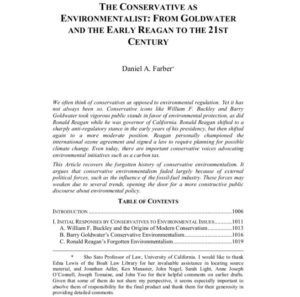This week’s selected media: The Conservative as Environmentalist: From Goldwater and the Early Reagan to the 21st Century; The Text and Context of “Enough and as Good”: John Locke as the Foundation of an Environmental Liberalism; Ayn Rand videos
This week I read and watched:

The Conservative as Environmentalist: From Goldwater and the Early Reagan to the 21st Century, by Daniel A. Farber: Farber is a professor of law and Director of the Environmental Law Program the UC Berkeley Law School. He published the document in 2017. It’s fascinating, covering support for environmental protections, ideology, and cases of bold activism from
- Barry Goldwater
- Ronald Reagan
- Richard Nixon
- William F. Buckley
- Milton Friedman
- George H. W. Bush
- Newt Gingrich
I was glad to see one podcast guest mentioned, Bob Inglis, and another person mentioned on at least one episode, I’ve emailed and spoken with, Jerry Taylor.
It begins:
Today, it may seem more natural to associate conservatism with opposition to environmental regulation. Just how far the conservative movement has shifted from its early attitudes on the environment is vividly exemplified by Ronald Reagan’s 1972 campaign to preserve the Sierras. Already a leading figure in the conservative movement, Governor Reagan made a dramatic horseback ride to announce his success in killing a major federal highway project in the Sierras. 3 In his inaugural address as governor a year earlier, he proclaimed determination “to preserve the magic beauty of California.” As Reagan’s ride illustrated, conservatives and anti-environmentalism were not always closely associated. In the early days of the modern conservative movement, iconic figures such as William F. Buckley, Barry Goldwater, and Ronald Reagan took outspokenly environmentalist positions. But by 1980, the earlier environmental enthusiasm of these conservatives had become clouded. Reagan adopted a harshly anti- environmentalist stance in his presidential campaign and in the first years of his presidency, then pivoted again to a more moderate approach—one that included his personal involvement in some environmental initiatives.
It also traces the move toward opposing regulation, but also shifts in preferences especially by age. Coming out just after Trump’s surprise election, Farber couldn’t predict far ahead, but he illustrates and explains why conservative thoughts and values supported environmentalism before.
I recommend this piece if you’re interested in U.S. politics on sustainability.
The Text and Context of “Enough and as Good”: John Locke as the Foundation of an Environmental Liberalism, by Susan P. Liebell: This paper, by a Chair and Professor of political science examines a few often neglected views from John Locke on property. From the abstract:
His theory of property limits individual rights by establishing rules of fair play (enough and as good), prohibiting waste (spoilage), and requiring the support of the poor (sufficiency). His text— particularly, the “enough and as good proviso”—connects equality, fairness, and the common good to the natural world.
I’ve come to see this understanding of property as critical to understanding what the U. S. Constitution means but we’ve missed: that by classical liberal values—meaning today’s conservative and libertarian values—it was never foreseen or intended to privatize so much of the commons. These values connect with basic human values of sustainable cultures going back hundreds of thousands of years, usually understood to us as “don’t take the last piece of fruit” or “leave some for nature.”
Ayn Rand and Ayn Rand Institute leader Yaron Brook videos: Two weeks ago I finished When McKinsey Comes to Town, which mentioned Atlas Shrugged in the context of a firm filled with Rhodes Scholars and people with advanced Ivy League degrees. I hadn’t thought the book enjoyed much support from that crowd, so last week I read (actually listened to) it. I’ve also been reading and learning more of Locke, Hobbes, Rousseau, Bentham, and J. S. Mill—that is, classical liberalism.
Rand enjoys more support than I thought, so I watched interviews of her and people who support her legacy. Did you know Johnny Carson hosted her three times for over twenty minutes each appearance?
Read my weekly newsletter

On initiative, leadership, the environment, and burpees